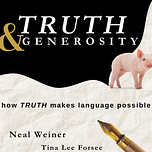“What we have been talking about is itself no thing, nothing particular, which is why it cannot be properly defined, and yet it shapes everything we can talk about.”
Thank for your support!
—Neal and Tina
13
The Heart of Truth
META-BELIEFS—beliefs about what makes a belief a belief and not a fancy, a supposition, or a wish—must be at the stable center of our system since any change in them would certainly affect all others. And because meta-beliefs are indispensable, they must either amount to or rub up against nothing less than the very meaning of truth—after all, when a belief cannot be dispensed with, what can we call it but true?
Quite possibly meta-belief, along with other foundational truths, are too abstract to be defined in any straightforward way. After all, they are supposed to name the most general properties of things, but there are no terms to express the most general properties of things. All other terms are either equally abstract, and hence equally vague and/or unsatisfactory, or they are more specific, which explains why attempts to define truth tend to mistake the species for the genus—as if we defined dog by referencing some particular breed, such as retrievers. Theories such as coherence and correspondence are like species of truth, but none can be a satisfactory definition of truth (or of being or goodness, for that matter). Reductionisms such as materialism, idealism, and hedonism make the same mistake. Definition must stop somewhere, and, logically, it must surrender at both the top and bottom of the conceptual mountain.
Listen to this episode with a 7-day free trial
Subscribe to Philosophy and Fiction to listen to this post and get 7 days of free access to the full post archives.









